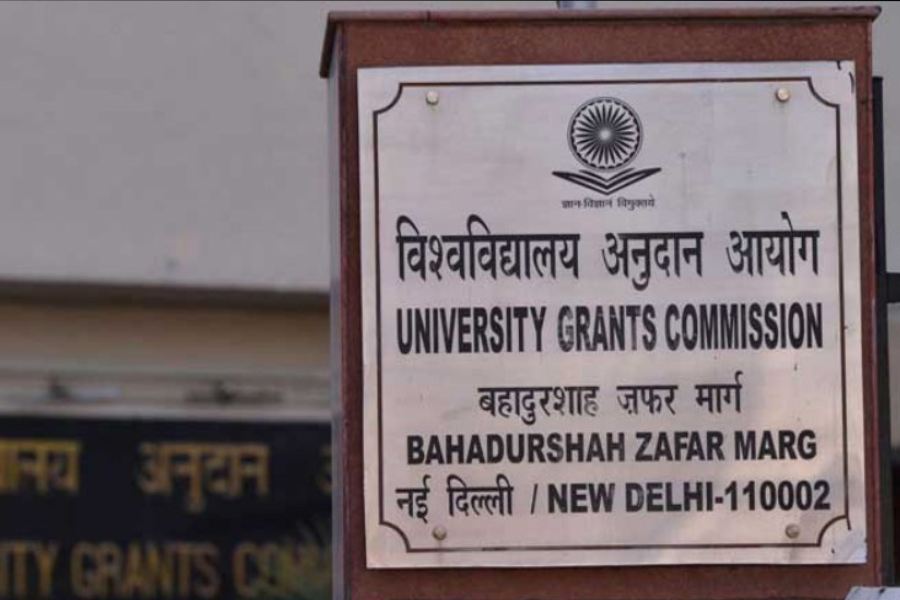The University Grants Commission (UGC) has drafted guidelines for granting equivalence and for recognition of degrees obtained from foreign universities, restricting degrees obtained through distance and online mode as well as through any franchise agreement.
The commission has also drafted norms for recognising qualifications obtained from schools affiliated to foreign boards as well as from offshore campuses of a foreign higher educational institution.
The norms come at a time foreign universities are in the advanced stages of setting up campuses in India's GIFT city and Indian universities are collaborating with institutions abroad to offer dual or joint degrees.
The higher education regulator in its draft Recognition and Grant of Equivalence to Qualifications obtained from Foreign Educational Institutions) Regulations, 2023, has covered internationally relevant curricula, academic and research collaboration with foreign universities and credit recognition under twinning arrangements.
"Qualification obtained from a foreign higher educational institution shall be recognized and granted equivalence provided the qualification has been awarded by a foreign higher education institution that is duly recognized in its home country.
"The student should have pursued the programme through regular, in-person instruction (and not through online or distance learning). The entry-level requirements for admission to the programme should be similar to that of a corresponding programme in India," it said.
The commission has noted that "similarity" of entry criteria will be determined through due process by the Standing Committee set up for the purpose based on similarity of minimum duration of the programme in India and the foreign country; minimum credit requirements and evaluation processes.
"Credits in different categories of courses may be examined and similarity established (such as basic background courses, disciplinary core courses, disciplinary elective courses, cross-disciplinary courses, laboratory courses etc), so that the equivalence also reflects the similarity in 'flavour' of the offerings in India and abroad," it said.
While the guidelines state that the minimum duration of the programme should be similar to that of a corresponding programme in India, in case the duration varies, the UGC will consider minimum credit requirements that should be the same in both institutions.
"In considering this, the commission will examine and grant equivalence to the definition of credit (number of contact hours per week, number of self-study hours, the quantum of experiential learning, etc) first, before the equivalence between the programmes is established. Up to 10 per cent variation of total normalised credit requirements may be given equivalence," the guidelines said.
In order to facilitate the mobility of students in a seamless manner, the UGC will maintain a dedicated online portal to receive applications to grant equivalence to qualifications obtained from foreign educational institutions.
This equivalence certificate will certify the "parity of a qualification" between a foreign qualification and the qualification awarded by an Indian Board or university at the same level.
According to the UGC regulations, the equivalence certificate will also be accepted by the universities in India for the purposes of admission or employment.
Currently, the evaluation division of the All India Universities (AIU) -- an apex inter-university organisation -- issues an "equivalence certificate" to students with foreign qualifications to facilitate their admission in Indian Universities. With the guidelines coming into effect, the UGC will also assume the responsibility of granting equivalence to foreign degrees.
Qualification obtained from off-shore campuses, according to the UGC, under dual degree or joint degree programmes will only be recognised if the academic programmes satisfy the accreditation requirements in the country where the offshore campus is located and in the country of origin.
"Qualification obtained in the offshore campus of a foreign higher educational institution shall be recognised provided the campus is duly approved by the competent authorities in India as well as in the country of origin. The academic programmes of the campus must also satisfy the accreditation requirements in the country where the offshore campus is located, as well as any such requirements in the country of origin.
"Qualification obtained through a franchise arrangement shall not be considered for recognition and grant of equivalence," it said.
For qualifications obtained at the school level from schools affiliated to foreign boards and offering a foreign system of education in foreign countries shall be recognised and granted equivalence provided that the school education has been pursued through regular mode only.
The other conditions are: a minimum 12 years of regular schooling has been prescribed by the concerned foreign system of education; the school from which the applicant has pursued education should be affiliated with a board that has been approved and recognised in the concerned foreign country; the school leaving certificate of the applicant should be issued by the board that has been approved, recognised or accredited in the foreign country concerned. The commission has sought suggestions from stakeholders on the draft UGC guidelines till September 16.
Except for the headline, this story has not been edited by The Telegraph Online staff and has been published from a syndicated feed.











